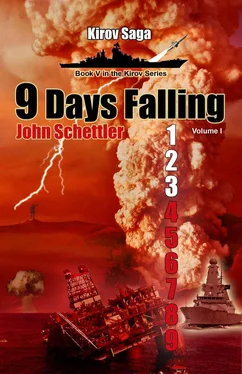The two men moved like silent assassins, so deft and purposeful, their weapons at the ready as they began to sweep the building’s upper floor. The first job was to rule out trouble in their immediate environs, he knew. Troyak slipped around the corner and was off down one hallway. Zykov drifted silently down the other hall toward the main stairs. Fedorov watched them go, then thought he had best draw his pistol, eying the dark back stairway with suspicion and some trepidation.
He crept slowly toward the stairs, suddenly surprised to see a strange amber glow there. It seemed to pulse and waver, like the flickering glow from a fire. Then he heard it again, that distant rumble, like bombs exploding or artillery firing, and the sound seemed to echo in the narrow confines of the hall. He started down the stair, lit now by the amber glow, his footfalls noisome on the old wood steps. It led down to the corner alcove near the hearth in the dining room. As he neared the lower level the amber light brightened to a warm ruddy glow. Could there be a fire?
A strange sensation overcame him, and he reached to brace himself near the bottom of the narrow stair. He thought he heard shouts, voices, but in a language he did not understand. “ Was fur ein gerausch? Was ist passiert?”
Seconds later he reached the bottom alcove, pistol held out before him like he had seen Zykov demonstrate. He stepped off the last stair, feeling very odd, a queasy sensation that left him dizzy for a moment. There was no smoke or fire that he could see, and no heat. Yet the terrible roar was louder now, a throbbing in the air, and he heard the crying of a baby, and people yelling outside the building.
Stepping quickly from the stairwell he could to see he was back in the dining hall, but it was bathed in ruddy light from outside the building. The drab tables were now covered with white linen, and dressed out with candle fixtures and styled table settings. Several windows were shattered, leaving shards of glass scattered over the floor. He saw food on one table, a chair overturned, a glass half filled with dark tea still quivering with a strange vibration in the air, as if the meal had been suddenly abandoned. Then the full realization of what he was seeing struck him. The glow he had seen was daylight! The rich red light of sunrise was streaming through the shattered windows on the eastern wall of the building, yet it seemed too bright, too searing. They must have fallen into a deep asleep, he thought, but the implications of this soon followed—they had missed their train!
He turned, thinking to go to the front desk and meet Zykov coming down the main stairs. When he walked into the reception area he found it empty and the front door was ajar, lit by that amber glow. Something was happening—outside—he could hear frightened voices on the street, and the sound of people running. There came a deep booming sound again, and he felt the windows shake with a tremulous rattle.
Troyak reached the end of the hall, his eyes tight, jaw set. He had checked every room, but no one else was billeted here for the night. The rail workers had eaten their meal and returned to the train to help with the freight operation. He squeezed the button on his collar and spoke quietly into the hidden microphone there.
“Zykov? Troyak here. All clear on the upper level.”
Zykov’s voice spoke in a quick return in his earbud: “Main stairway and front desk clear. Checking the entrance and outside grounds now.”
Then he heard it again, the deep rumble, like distant thunder, or far off explosions, yet it was not coming from outside, but behind him, echoing down the long hallway. He turned, his attention immediately drawn to the source of the sound, and spoke into his collar microphone again. “Fedorov—are the back stairs clear?”
There was no answer.
Troyak was off at once, his arms stiffly leading his line of movement, pistol held securely in both hands. He reached the open door to their room and slipped inside. “Fedorov?”
There was no answer.
A cursory search satisfied him that the room was empty, and he holstered his pistol, snatching up his automatic SMG and flipping off the safety. Then he moved like a shadow, out the door and quickly to the back stairs. All was quiet and dark there, and he flicked a switch on his weapon to activate a search light. The narrow stairs extended down, their small wooden steps covered with dust, but he plainly saw the imprint of a man’s footsteps, heading down. Fedorov, must have gone that way, he reasoned, and he started down after him.
The Sergeant reached the bottom landing, springing quickly out of the alcove into the dining room, weapon at the ready. The room was dark and silent, the embers of the fire the only source of light beyond the pale moonlight that gleamed on the windows and cast its wan pallor over the bleak, empty tables.
He heard a door creak open, and quickly withdrew to the alcove. The young serving woman, Ilanya had emerged from her room behind the front desk. When she saw Troyak she immediately shirked, clutching a plain grey robe to her throat.
“What is wrong?” she said fearfully.
There were heavy footfalls at the front entrance and Troyak stood waiting, his finger drifting quietly to the trigger of his weapon. Then in walked Zykov, his automatic weapon in hand, and a look on his face that was all business.
“All clear outside,” he said, looking at his watch. “No sign of trouble. The station is quiet and they are still offloading freight. It is only 10:30.”
Troyak looked at the serving woman. “Have you seen our comrade colonel?”
She shook her head in the negative.
Troyak turned so the woman would not see him and reached into his service jacket, pinching off the IFF locator squeeze switch. He listened while the voice played in his earbuds, then spoke quietly in return. “Locate signal zero alpha one.”
“Searching…” Came the voice in the earbud. “Signal not found.”
“I was sleeping,” said Ilanya, “until I heard you coming down the stairs.” She eyed the dark back stairwell with obvious apprehension, remembering all the stories her parents had told her about them. The haunted back stairway—the stairs—the way she never went for any reason, where the dust lay heavy on the weathered wood and shadows lay in deep folds, shrouding the narrow way up.
Fedorov was gone.
“The myth of unlimited production brings war in its train as inevitably as clouds announce a storm.”
~ Albert Camus
Thetrouble started far to the west in the Gulf of Mexico where men in hundreds of offshore oil platforms were working just a little harder after hurricane Victor rampaged through the region. Houston was still shut down, the spigots on pipelines, platforms and refineries all along the Gulf coast clamped tight. Over 80% of America’s fuel system was now off line in the wake of the storm. That was going to put a whole lot of pressure on all overseas operations to make certain new supplies of crude were well out to sea and heading for the US to relieve inevitable shortages that were already cropping up in the southeastern and southern states.
Things were also heating up in the Caspian region, and the work in the fields there had seen several interruptions in the last few weeks due to security problems—situations that always got Ben Flack’s blood boiling, because Ben was a Chevron “Company Man,” and a schedule man when it came to moving the oil from one place to another. The work of all the other men, Toolpushers, Drillers, Roughnecks, Roustabouts, Derrickhands, and Mud Engineers, all deferred to him. Flack had the final say on all operations, answerable only to the other company men at Chevron headquarters back in the states.
Читать дальше












